
Animal Drawing for Absolute Beginners
Radically improve your sketching skills - in weeks, not years.
Is this the year you finally get that sketchbook and start improving your drawing skills?
You drew a lot as a kid, but then adulthood happened to you, and you lost the time, energy and patience for making art.
You've missed it ever since. You've fantasized about picking it back up many times.
Maybe you've even made a few attempts to revive your inner artist: Bought a sketchbook, doodled a bit, followed some tutorials, made an embarrassing sketch of your dog that you immediately wanted to rip out and set on fire.
Turns out, the actual experience of sitting down to draw is wildly different from how you imagined it in your mind, and remembered it from your childhood.
Gone is the ease, and flow, and spending hours in your own little creative bubble. Now drawing feels awkward, stiff, and frustrating. You look at the artists you follow on social media and wonder how they do what they do. They must have some kind of talent that you were not bestowed with, and so many more years of practice that you'll never hope to catch up.
This whole art endeavor feels like way too much work and suffering to be worth your time. Guess you missed your chance. Oh well, better to just forget that dream and go be "productive" instead...
Does this sound like some version of your experience?
It certainly was mine.
This is the course I wish I’d found back then.
Here's the truth...
- You don't need "natural talent" in order to get really good at art.
- It's never too late to become a skilled artist, or even make it your second (or third, or fifth) career.
- You don't need a ton of information, tutorials, tips and tricks. You need more quality practice time.
- Getting radically better at drawing doesn't have to take years. You can make noticeable improvement in weeks, or even hours, with the right practice routine.
- Drawing is an incredibly healing, relaxing, meaningful, and worthwhile activity.
- You deserve to sit down and draw, guilt-free, and have a good time. Just like when you were a kid.

Hi, I'm Louise
A few years ago, I was a burned-out freelancer. In an effort to calm myself down, I returned to my childhood love of drawing and painting. I got myself a sketchbook. I started drawing birds - my spirit animals. I finally overcame my inner critic, and completely changed my mindset around making art. And I eventually went on to start a whole new life as an artist.
Today, I make and teach art full-time, and help others embark on their own art journeys.
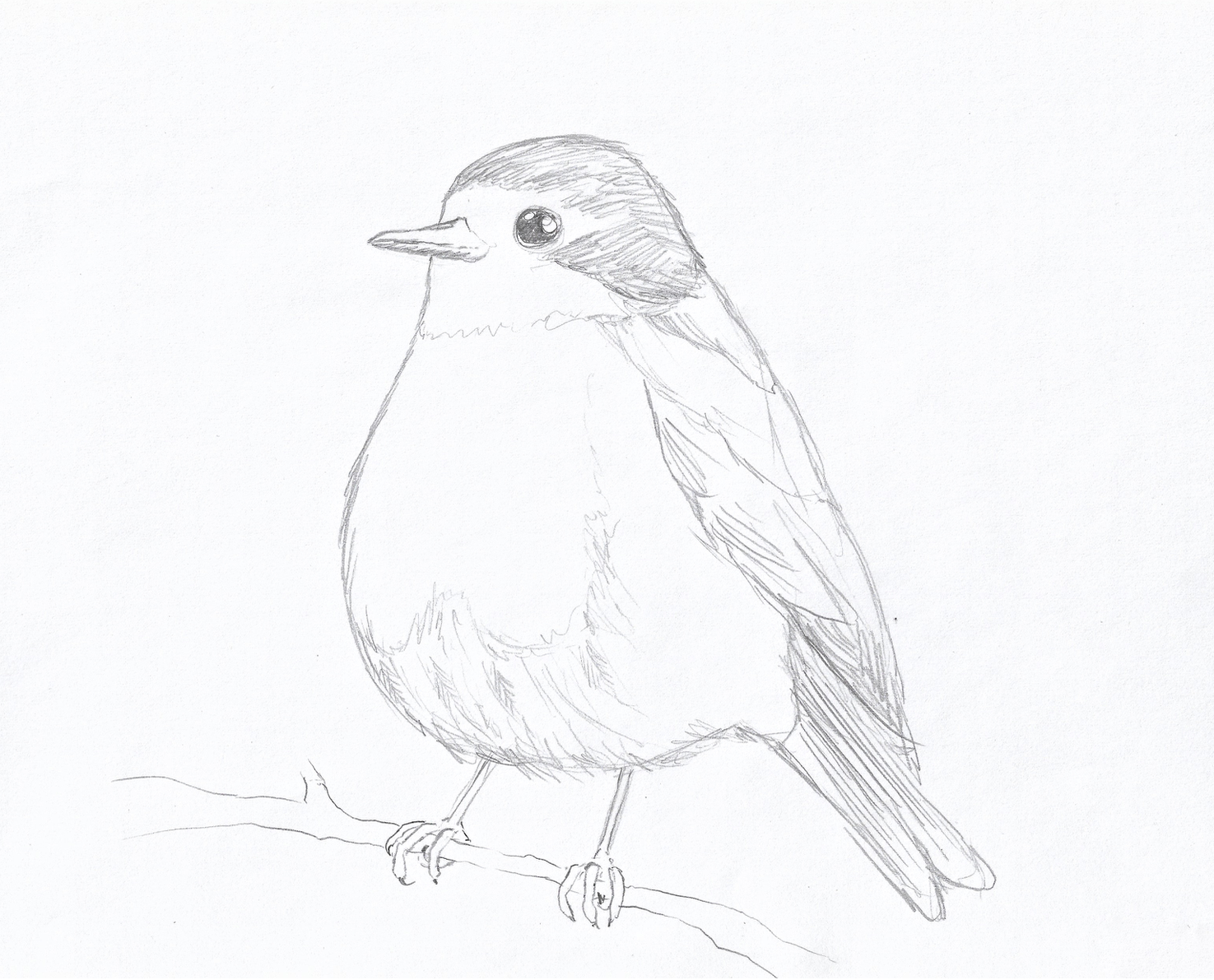
My first bird drawing...
I've started an art practice many times. And quit almost as many.
Just like most of us, I loved drawing as a kid. I even hung onto it well into my teenage years.
But then art fell by the wayside, and became increasingly difficult to pick up again. I developed an "on-and-off" relationship with art. Short, passionate bursts of practice and motivation, followed by boredom and frustration.
The older I got, the more sparse my drawing sessions became, and the more hopelessly behind I felt. Improving at art felt like a painfully long journey, full of comparison, performance anxiety, and disappointment.
Going online to find drawing tutorials usually made me even more stressed, because there was too much of it there, and a lot of conflicting advice.
The harder I worked to improve, the more overwhelmed I became.
But then, when I came to art in the middle of burnout (and a pandemic), something changed. I had no energy for my usual, performance-based mindset. I didn't want to hustle. I just wanted some relaxation and zero-pressure creative time. I wanted to draw like when I was a kid - without a care in the world.
And that mindset shift changed everything for me.
I discovered an approach to learning art that kept me coming back to my practice, no matter how hard it felt, or how frustrated I was with myself. In fact, I now thrived in that challenge. And as a result, I improved steadily.
Years later, I realized something else:
I had been way overcomplicating learning to draw.
Those tips, techniques, and methods I had overstuffed my brain with could have been distilled into just a handful of simple-to-grasp concepts. And by just focusing on practicing those, in a relaxed and straightforward daily practice, I could get 80% of the way towards my art goals.
I want to share both my mindset shift, and my simplified drawing system in this course. So that you can fast-track your skill improvement, avoid the most common pitfalls that get beginner artists stuck, and settle into a pleasurable practice routine you'll look forward to.
You'll learn...
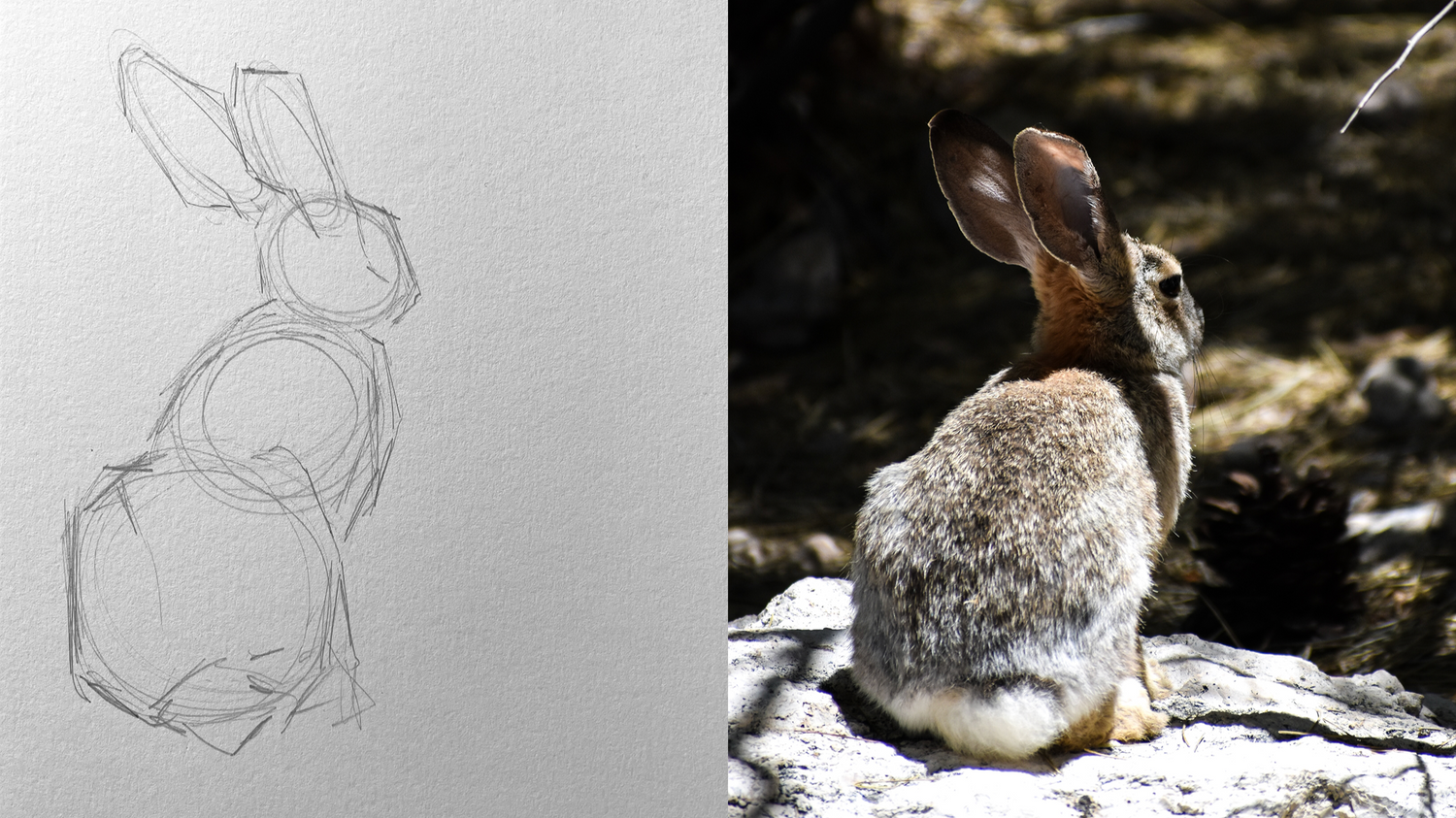
How to see the world, as an artist.
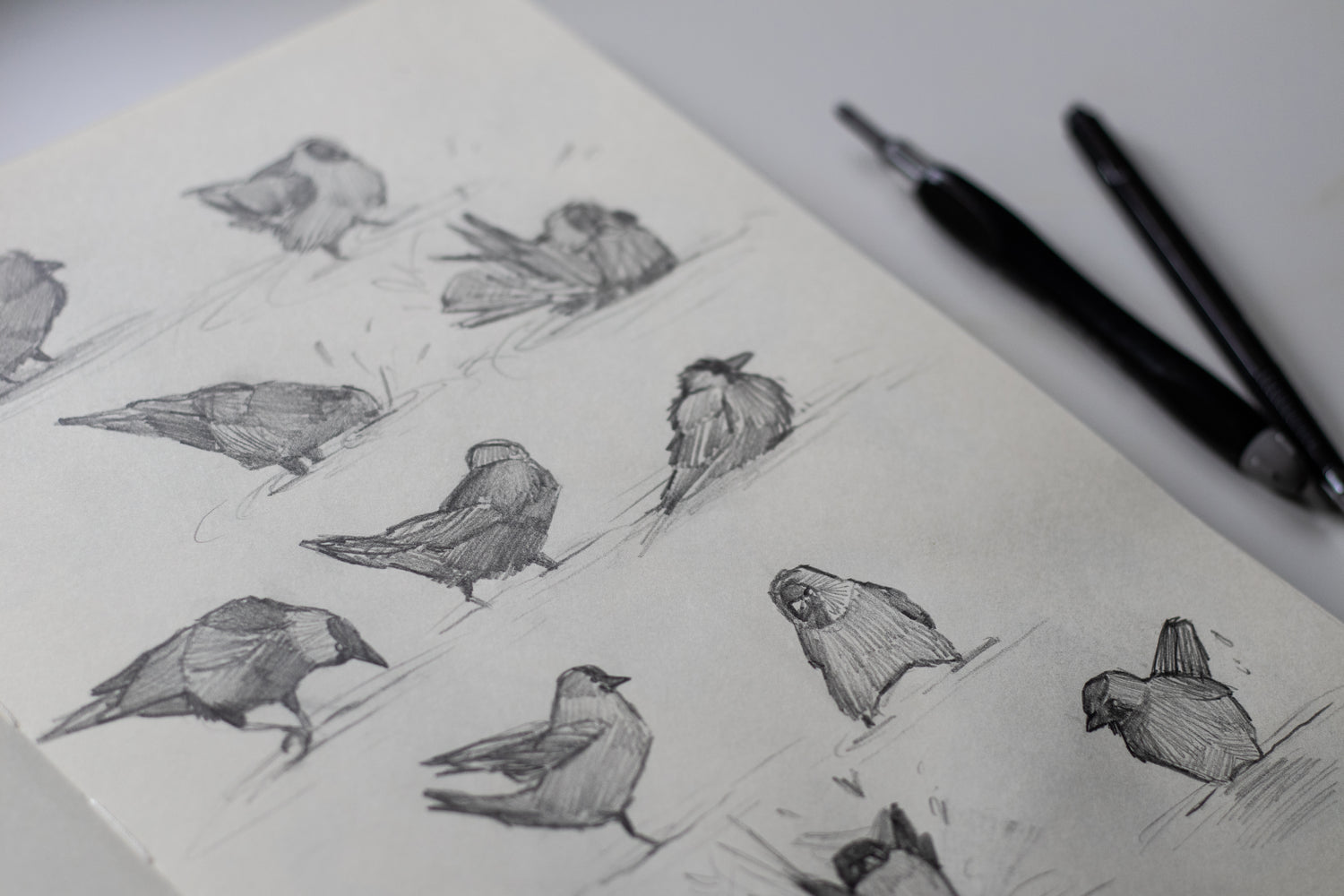
How to accurately capture what you see, quickly and confidently.

How to shade your drawings, and add depth and atmosphere to them.

All the tools you need for drawing, and how to use them.
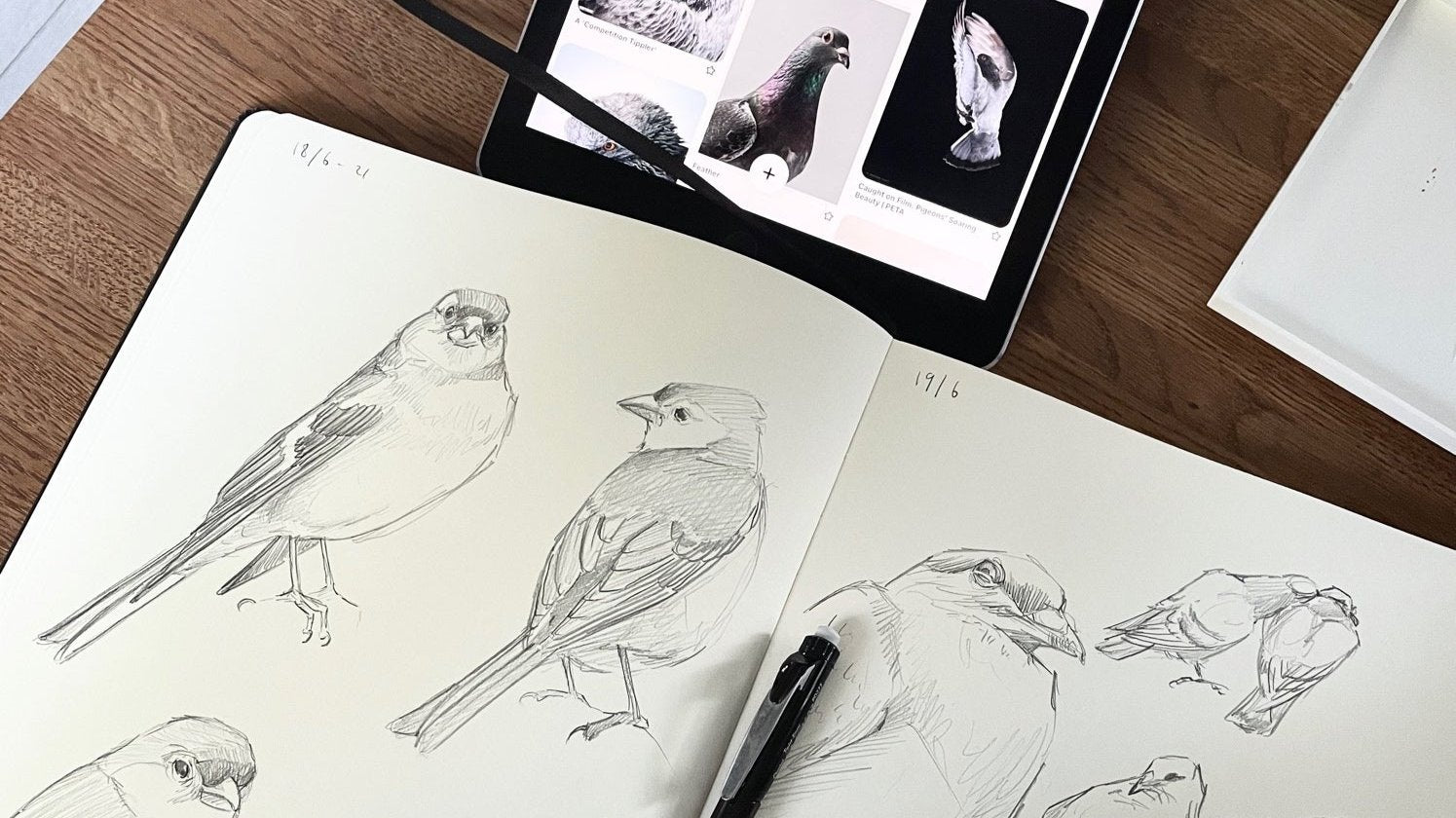
How to create a practice routine you actually look forward to, (and never want to quit.)
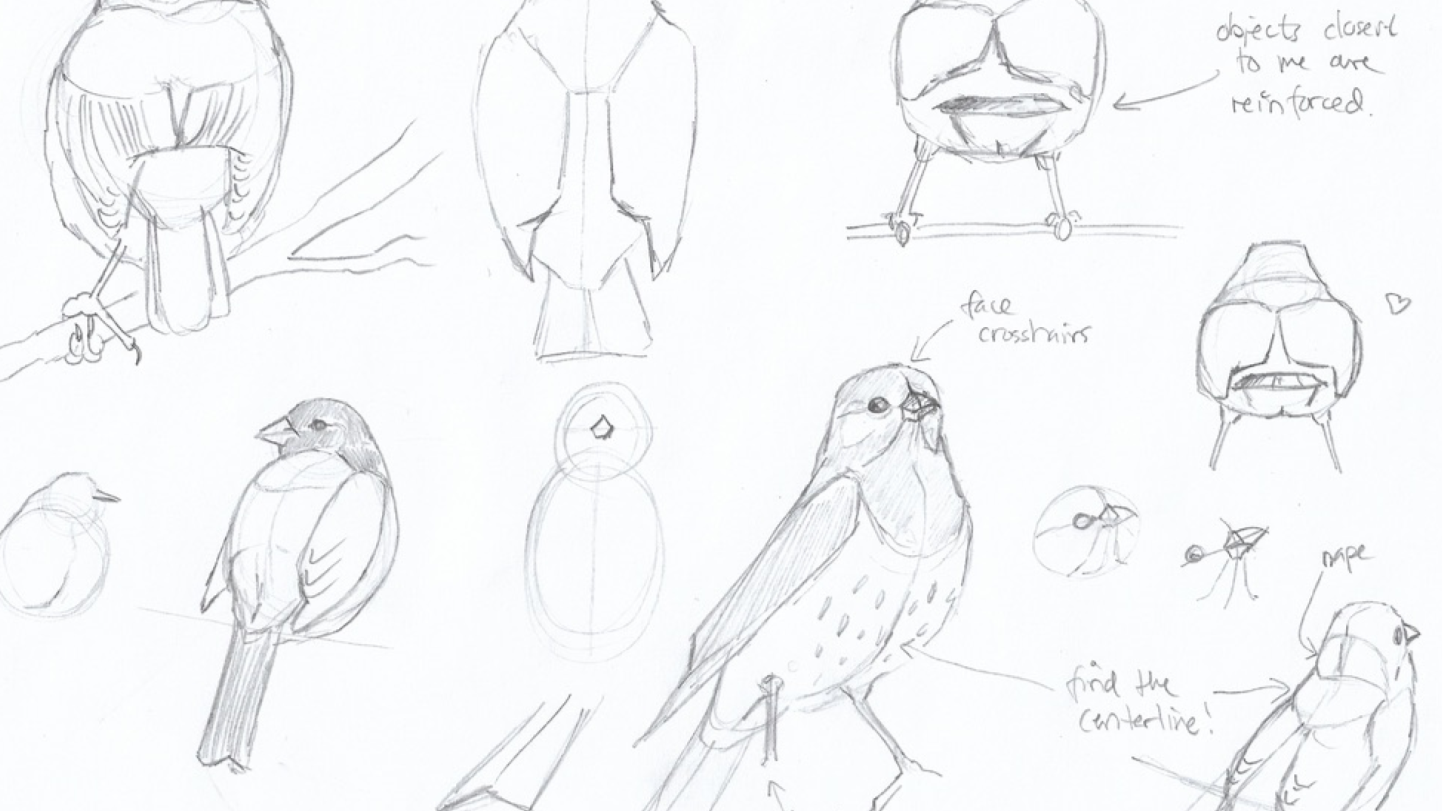
How to analyze your work, and be your own art teacher.
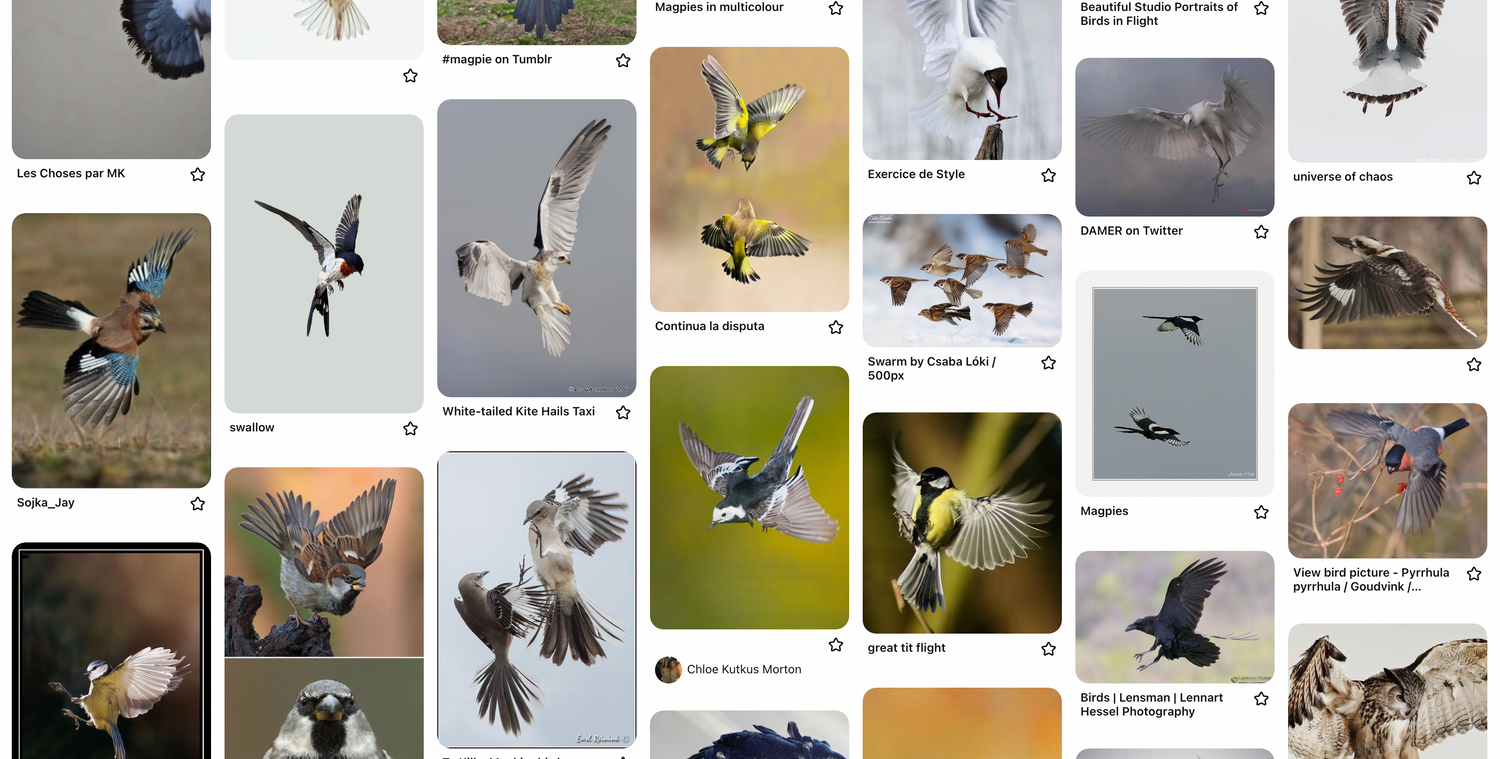
How to find, and work with, quality drawing references, (and do your own thing with them.)
The curriculum
Week 1: Getting started
Welcome to the course!
(4:46 min)
- Common misconceptions about learning art.
- What to expect from this course.
- The curriculum, week by week.
The mindset needed to really enjoy an art practice (and not quit after a week)
(5:47 min)
- The mistakes we make when learning art.
- The difference between a results-oriented vs. a progress-oriented mindset.
- Why making art is healing.
- How to overcome your inner critic and perfectionist.
- How to love the challenge of learning art.
Materials for sketching and drawing
(10:05 min)
- My favorite tools & materials.
- A guide to drawing pencils.
- Paper types, and how they differ.
- 3 types of erasers, and how to use them.
- The magic of blending stumps.
Warming up
(26:30 min)
- Why I don't believe in traditional warm up exercises.
- How to hold, and move, the pencil.
- My favorite subject to draw when warming up.
- Exercise: Warming up.
Course project 1
(06:59 min)
- How we'll work with references in the course.
- My philosophy on "realism" in art.
- Iterative drawing, and why it's so powerful.
- An introduction to the course project.
- Exercise: Course project iteration 1
Week 2: Accuracy
Simplification
(17:13 min)
- The most common way we mess up our drawings.
- The very first thing you should do when starting a new drawing.
- Exercise: Simplification
Eye measuring
(21:32 min)
- How artists arrive at accuracy in their drawings.
- What eye measuring is, and how to do it.
- My favorite tricks to get proportions right in my drawings.
- Drawing aids and when (not) to use them.
- Exercise: Eye measuring.
Course project 2
(14:43 min)
- My course project demonstration.
- Exercise: Course project 2
Week 3: Shading & edges
Values
(20:19 min)
- What values are.
- Weak vs. strong values, and the importance of contrast in art.
- How to identify good references for drawing.
- How to modify your references to make your job as an artist easier.
- An introduction to shading techniques.
- Full value study demonstration.
- Exercise: Values.
More values demonstrations
(21:04 min)
- 2 additional drawing & shading demonstrations.
Edges
(21:03 min)
- What edge control means in art.
- Why leaving the viewer guessing is a good thing in art.
- Hard, soft, and lost edges and how they work together to add dimension to your art.
- The importance of focal points and contrast.
- Full edge control demonstration.
- Exercise: Edges.
More edge demonstrations
(38:14 min)
- 2 additional shading & edges demonstrations.
Course project 3
(31:29 min)
- My course project demonstration.
- Exercise: Course project 3
Week 4: Building a thriving art practice
Creating a practice routine (that you'll enjoy)
(06:40 min)
- Why a sustainable drawing practice needs to feel simple and enjoyable.
- What deliberate practice means.
- The benefits of copying another artist's work for practice.
- How to look for targeted drawing tutorials to solve problems in your practice.
- Exactly what my practice routine look like.
- How to always walk away from a drawing session feeling proud and satisfied. (Even if you hate your art.)
Tracking your progress (and staying motivated)
(05:28 min)
- How to track your progress, and stay motivated.
- The number one thing you need to do in order to reach your art goals.
- How to problem solve your drawings and be your own art teacher.
- How to keep an art journal.
- How to deal with frustration and self-criticism in your practice.
Building your own reference library
(02:10 min)
- The importance of keeping your own reference library.
- How to not feel limited by your references.
- Where to find quality drawing references.
- List of my favorite platforms and websites for sourcing references.
Final words
(02:07 min)
- A final thank you for reaching the end.
- Instructions for claiming your "finisher reward".
At the end of the course, you will feel...
- Relieved at how straightforward (and non-boring) improving at art can be.
- Surprised at how much you're enjoying yourself, even when your sketches don't turn out great. (That will happen. It happens to all of us.)
- Encouraged by how much better your drawings look now.
- Excited to keep up the good work, go deeper in your practice, and maybe explore other subjects and techniques.

“I am a complete beginner, and this class helped me a lot to conquer the fear of starting something. I actually got a lot of stuff on paper that I am happy about and that encourages me to continue. If you have no experience with (pencil) drawing at all, this is a great place to start.”
- Oliver M

“Your class changed my drawing life completely. I think it’s the most effective class I’ve had so far, and I actually wish I could meet you to tell you in person because you deserve that kind of appreciation.”
- Florianne Paap

“Very inspiring class! Loved the attitude and approach of the instructor. Made me feel like I could do this.”
- Ramae Hamrin

“Best course on sketching I have seen.”
- Ari Johnson

“Very calm, laid-back instruction that makes it easier to not stress over learning these fundamental skills.”
- Beth Jones
Ready to start your art journey?
Let's kickstart it right now, so you can go from dreaming to doing, and from struggling to improving.
Animal Drawing for Absolute Beginners
✓ 17 lessons ✓ 4 hours and 21 minutes of video content ✓ Accessible on any device, at your own pace ✓ Unlimited lifetime access ✓ 25% paid back to you if you finish the course and share your results.




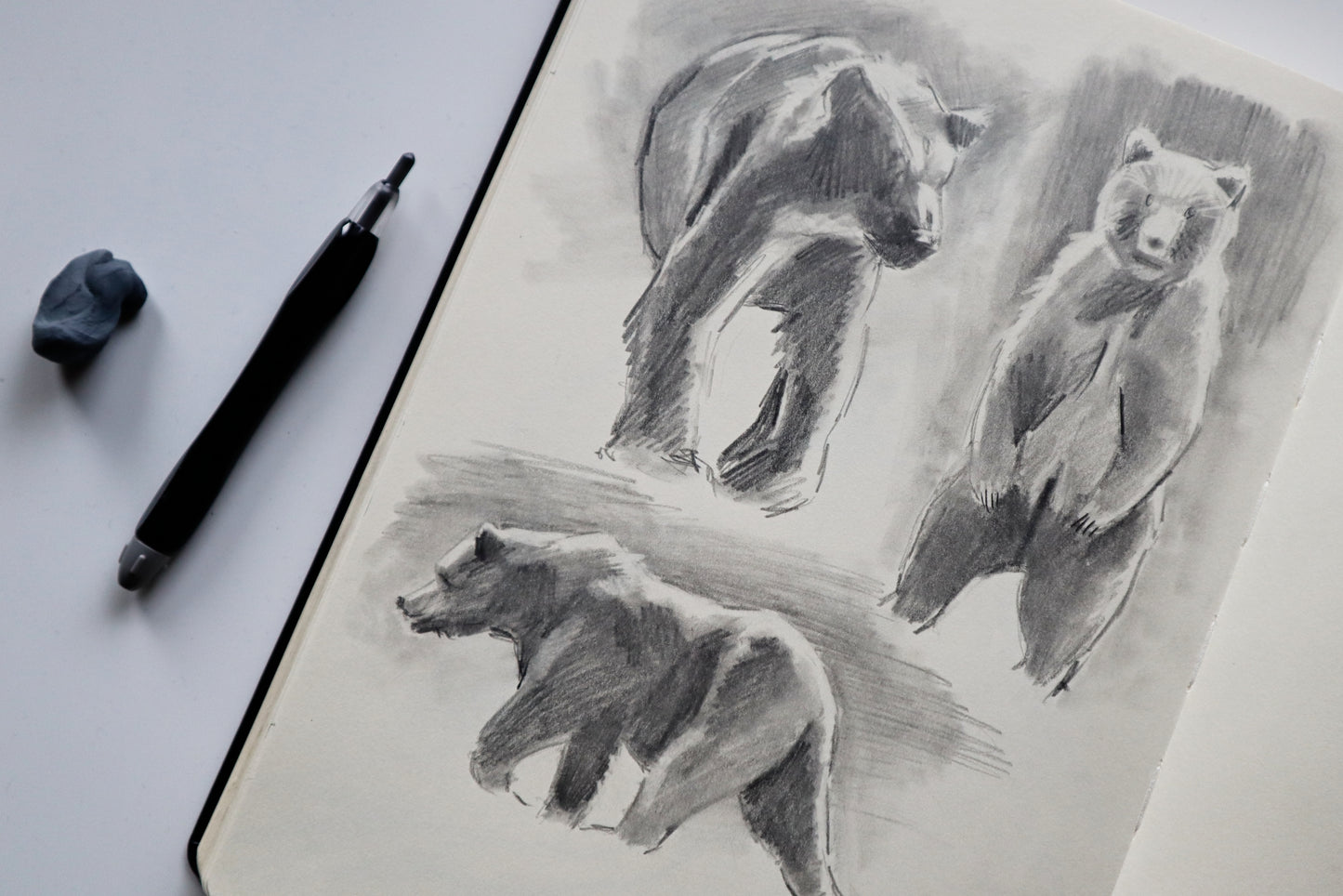
This is the course for you if:
- You've always dreamt of becoming an artist, but have struggled with motivation and sticking to an art practice.
- You don't want to waste years of your life practicing without a clear goal and routine, not seeing any real progress.
- You don't have the time (or money, or patience) for traditional art school, or loooong course curriculums.
- You're overwhelmed by the onslaught of free drawing tutorials online and want a simple, step-by-step study plan with zero fluff.
- You love animals, and feel drawn to portraying them in your art.
- You want drawing to feel pleasurable, and not like a tedious chore.
Questions you might have
How do I access the course?
The course is hosted right here on my website. You will first create an account, and then you’ll be able to log in at any time to access the course.
You can do this on your computer, phone, or any other device.
How long does it take to finish the course?
The course is designed to run over 4 weeks, to give you plenty of time to watch the lessons, do the assignments and exercises, and see some promising improvement.
Will you teach me how to draw fur/wings/eyes/antlers/beaks?
This is not an animal anatomy course. There aren't any detailed tutorials on how to draw different body parts, because those body parts will look different in each new reference photo.
I focus on the big picture skills in this course, and the fundamental techniques that will let you draw anything you see accurately. That includes fur/wings/eyes/antlers/beaks/any other body part imaginable.
And when you do want to get more nitty-gritty on a particular detail in your drawings, I'll show you how to find the right resources for that.
Will I be able to ask questions during the course?
Of course! There's a comment field underneath every lesson, where you can ask questions publicly and see replies to other students' questions. You can also ask questions in the course community.
If you ever want to ask me a question privately, you can do that via email.
Can I get feedback on my work?
Yes! The course comes with a community forum where you can upload your work and get feedback on it from me and other students.
Can I gift this course to someone?
Yes! You just purchase the course as usual, and when viewing your cart, there is a message box where you can write the full name and email address of the person you'd like to gift the course to + a personal message to them. I'll then send them an invite to the course at a date you decide.
What's your refund policy?
Due to the digital nature of the course, all sales are final. Please read through this page carefully to determine if it's for you, and do reach out to me with questions if you have them.
I'm dedicated to giving you an amazing experience, and help you get great results. That's why there's a course community where you can ask questions and get feedback on your work.
And if you go through the full course, do the exercises and course project, and give me some feedback on your experience, I will reward you with 25% of the course tuition paid back to you.

